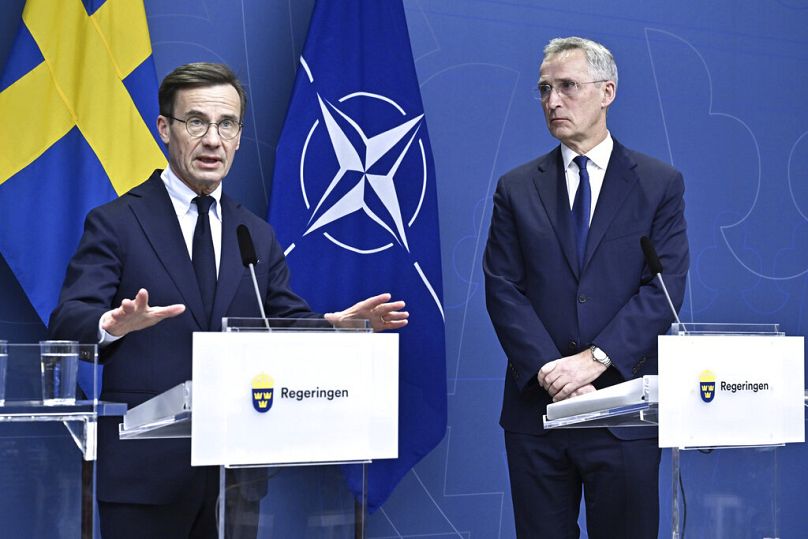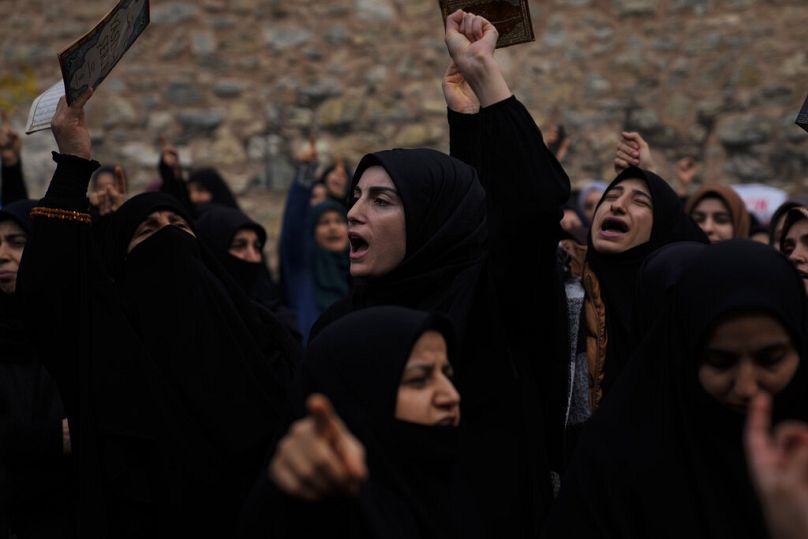Euronews looks at why Sweden's NATO application has yet to be ratified by the military alliance's member states. Behind the delay, Turkey's calls for extraditing suspected militants, a demand to lift an arms embargo, and fears that ratification might provoke Russia.
The security threats and risks tied to Russia’s full-scale invasion of Ukraine pushed Finland and Sweden to apply for NATO membership. They initially said they’d go through the process together. On 4 April 2023, Finland officially became the alliance’s 31st member. But Sweden is still waiting. So, what’s the hold-up?
Barriers to entry
Since the mid-1990s, both countries have participated in the NATO Partnership for Peace Programme and maintained close ties with the Alliance. NATO Secretary General Jens Stoltenberg called these two countries the closest to the bloc.
At the NATO summit in Madrid in June 2022, alliance members almost unanimously voted for the admission of Sweden and Finland. Only Hungary expressed concern that this would provoke Russia. However, it did not interfere with any such decision (although it has not yet ratified it either).
The only NATO member country that openly spoke out against Sweden and Finland's membership was Turkey. Turkish officials accused them of harbouring militants from organisations that Ankara considers terrorists - such as the PKK, PYD, YPG and Gülen movement - and demanded their extradition to Turkey.
Another condition that Ankara presented to Stockholm was the lifting of an arms embargo against Turkey, introduced after the Turkish military operation in northern Syria.
In June 2022, a tripartite memorandum was signed between Sweden, Finland and Turkey in Madrid. It provides for the creation of a "Permanent Joint Mechanism" between Ankara, Stockholm and Helsinki.
Under this document, Sweden and Finland pledged to conduct a “more effective fight” against terrorism and to hand over certain Kurdish activists to Turkey.
How Sweden Responded to Turkey's Demands
After the Swedish elections of September 2022, political power passed from the Social Democrats to a coalition government of conservative parties. Just weeks later, the new government lifted the arms embargo against Turkey and passed a new anti-terrorism law.
In early October, representatives from the Ministries of Justice in Sweden and Turkey held a meeting on the extradition of individuals requested by Ankara. The new Swedish Prime Minister, Ulf Kristersson, sent a letter to President Erdogan saying that Stockholm was ready to meet Ankara's demands.
But at the beginning of 2023, relations soured once again after a far-right activist in Sweden burned a copy of the Quran.
On the same day, supporters of the Kurdistan Workers' Party (PKK) took to the streets of Stockholm to protest Turkey's policies. Soon after, Ankara withheld support for Sweden's NATO accession, citing anti-Turkish actions.
How are things now?
The NATO membership protocols for Sweden and Finland were signed on 5 July 2022. By the time Finland joined the alliance, nine months later Sweden's application had been ratified by all participating countries, except for Turkey and Hungary.
What will change after the Turkish elections?
On 28 May, the second round of presidential elections took place in Turkey. Ahead of the vote, experts and analysts discussed which presidential candidate would make negotiations with Sweden easier.
It was believed it would be easier for the opposition to approve Stockholm's application since it does not have strict requirements for the immediate extradition of all political emigrants.
However, it was also claimed this position is part of Erdogan's election campaign. Having kept his role as president, he can make concessions in the case of receiving preferences in military, political or economic terms.













